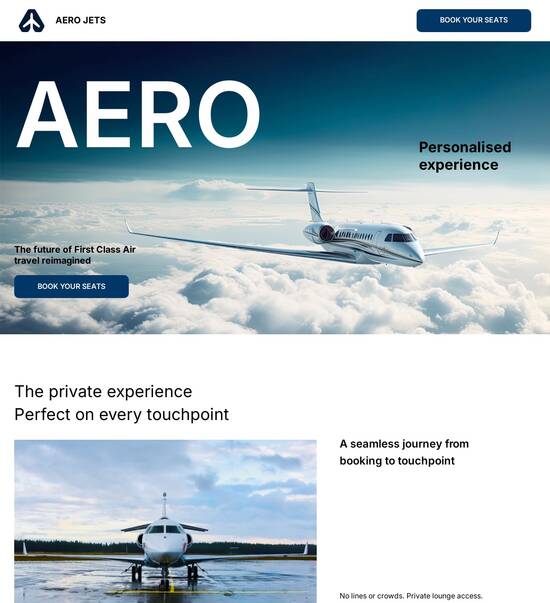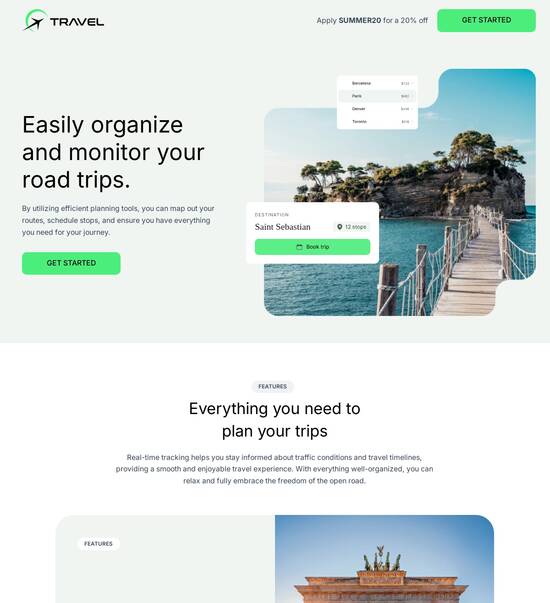
One Page Website Template for Media Companies
Explore Similar TemplatesAbout template
Create stunning landing pages specifically designed for media companies with our easy-to-use template. Optimize for conversions, personalize content, and collaborate seamlessly for maximum results.
Recommended templates

Easy to build without coding
With the intuitive drag-and-drop builder, anyone on your team can create high-converting pages without any knowledge of code or design. Make enhancements to your landing page with custom widgets using Javascript, HTML/CSS, or third-party scripts.

Multiple layouts for any industry and goal
Select from 500+ landing page layouts built to boost conversions across industry-specific scenarios. Customize them by adjusting fonts, adding images, and generating on-brand content with the AI assistant. Quickly scale with Instablocks® and Global Blocks that you can save, reuse, and update globally.

Loads fast and looks polished on any device
Every template is responsive, which means they present professionally on any device and load blazingly fast with our Thor Render Engine. You can also power them up with Google AMP technology to deliver an unparalleled mobile experience and drive higher conversions.

Robust analytics & experimentation
Get real-time updates and reporting across all your devices, showing the number of visitors, conversions, cost-per-visitor, and cost-per-lead. Launch AI-powered experiments, run A/B tests, and use heatmaps to analyze user behavior, then optimize your landing page to maximize conversions.







Easy to build without coding
With the intuitive drag-and-drop builder, anyone on your team can create high-converting pages without any knowledge of code or design. Make enhancements to your landing page with custom widgets using Javascript, HTML/CSS, or third-party scripts.
Multiple layouts for any industry and goal
Select from 500+ landing page layouts built to boost conversions across industry-specific scenarios. Customize them by adjusting fonts, adding images, and generating on-brand content with the AI assistant. Quickly scale with Instablocks® and Global Blocks that you can save, reuse, and update globally.
Loads fast and looks polished on any device
Every template is responsive, which means they present professionally on any device and load blazingly fast with our Thor Render Engine.
Robust analytics & experimentation
Get real-time updates and reporting across all your devices, showing the number of visitors, conversions, cost-per-visitor, and cost-per-lead. Launch AI-powered experiments, run A/B tests, and use heatmaps to analyze user behavior, then optimize your landing page to maximize conversions.
All the features you need to build lead-generating landing pages
Explore more featuresLearn how to build top-performing landing pages for any goal
FAQs
Leading the way in building high-performing landing pages





Maximize Your ROI with Instapage's Landing Page and CRO Platform
Instapage is renowned for delivering high-performing landing page solutions tailored to marketers across industries. Whether you're in business services, marketing and advertising, or the tech sector, our all-in-one platform empowers you to design, optimize, and scale your digital campaigns with ease and efficiency.
Why Choose Instapage for Landing Pages?
Instapage offers a user-friendly experience with an extensive library of more than 100 high-converting landing page templates and lead generation elements. These resources enable swift page launches that align with your campaign goals, ensuring you capture leads effectively from the get-go.
- Access to 100+ conversion-optimized templates: Our templates are designed based on proven marketing principles to enhance conversion rates.
- Pre-built lead generation elements: Utilize buttons, forms, and images that are ready to deploy, speeding up your page creation.
- No coding required: Instapage's intuitive visual builders make it easy for marketers at any skill level to create stunning landing pages.
Step-by-Step Guide to Creating Your Landing Page
Creating a landing page that converts involves a few streamlined steps:
- Define your target audience: Segment your audience based on demographics and preferences for better targeting.
- Choose a template: Select from our extensive template library that aligns with your campaign’s objectives.
- Customize your page: Use our drag-and-drop builder to tailor content, images, and forms without any coding knowledge.
Optimizing for Higher Conversions
Once you have your page set up, it's essential to optimize it for maximum performance. Here are crucial steps to enhance conversion rates:
- Implement A/B testing: Test variations of your page elements to identify which combinations yield the highest conversions.
- Utilize heatmap features: Analyze on-page behavior to understand what sections capture attention and what doesn't work.
- Leverage personalization tools: Utilize dynamic content based on user segments to tailor each visitor's experience.
Collaboration Features to Boost Efficiency
Collaboration is key in today’s fast-paced marketing landscape. Instapage streamlines teamwork through real-time feedback and editing tools. Here's how you can optimize your collaboration process:
- Instant feedback loops: Facilitate quick reviews and suggestions from team members for timely updates.
- Real-time edits: Make changes on-the-fly during collaborative sessions, saving time during the campaign launch.
- Secure sharing: Easily share your landing pages with external stakeholders, gaining insights beyond your immediate team.
In conclusion, Instapage equips you with the essential tools for creating and optimizing landing pages tailored to your unique audience, significantly enhancing your marketing ROI.
Ready to transform your digital marketing strategies? Start your free trial with Instapage today and explore the full potential of landing page optimization!
One page website template for media companies
Understanding the need: The digital landscape for media companies
In the evolving digital landscape, media companies must adapt to meet the expectations of their audiences. A key trend in this adaptation is the rise of one page websites. These websites cater to the need for rapid information consumption, especially as attention spans continue to decline. By simplifying content delivery, one page websites enable users to find what they need without the clutter often associated with multi-page sites.
Furthermore, the mobile-first design approach is prevalent. As more people access content on mobile devices, media companies must ensure their websites are fully optimized for mobile viewing. A one page template can lead to better functionality and a more pleasant user experience, especially on smaller screens.
A compelling online presence is critical for media companies. A strong website builds brand identity and fosters engagement with diverse audiences. To achieve this, media companies should focus on key goals such as driving traffic, improving user experience, and converting visitors into leads.
Unveiling the one page website template
A one page website template is designed to present refined messaging in a distilled format. Unlike traditional websites, which can overwhelm users with information, a one page template houses all essential content within a single scrollable page. This contributes to a seamless user experience and aids in quick retention of information.
Streamlined navigation is another hallmark of one page websites, which helps users find information quickly without the frustration of clicking through multiple pages. This clarity is essential for maintaining user interest and ensuring they stay engaged.
Effective one page templates also include features tailored to the specific needs of media companies. Dynamic layout options allow for customizable themes that can reflect a brand’s identity, while multimedia integration through video backgrounds and audio snippets enriches storytelling and engages users more effectively.
Development insights: Creating an effective media template
Developing a one page website template requires a thoughtful approach to technology. Backend considerations are paramount to ensure performance and responsiveness. Choose server-side languages such as PHP or Node.js, as they provide robust frameworks for dynamic content delivery. Additionally, effective database management solutions are necessary to maintain data integrity and speed.
On the frontend, leveraging Typescript can enhance the user interface and user experience. This statically typed language improves code quality and eases the debugging process. By enhancing interactivity and responsiveness, it aligns with the user’s expectations for modern web experiences.
A holistic approach between software engineers and designers is vital for success. Collaboration helps bridge gaps in understanding and ensures that technical specifications align with design intentions. By employing agile development techniques, teams can maximize efficiency and respond quickly to user feedback and market changes.
The power of themes in media templates
Themes play a significant role in media templates, as they serve as the visual representation of a brand's identity. Exploring diverse themes allows media companies to make creative expressions that resonate with specific target audiences. Trending themes keep a website contemporary and aligned with user expectations, while custom themes provide a unique touch that highlights company values.
When selecting a theme, media companies should consider how well it aligns with their brand identity and values. Usability should always be a priority; the theme should enhance user experience rather than detract from it. Additionally, a responsive design that looks great on both desktop and mobile can significantly improve user engagement.
Discounts and offers: Leveraging cost-effective solutions
For media companies, finding value in discounts and offers can help stretch marketing budgets. Seasonal promotions can be a great way to acquire templates at lower costs, especially if companies plan ahead and time their purchases effectively. Additionally, many providers offer volume discounts for larger teams, which can further reduce expenses.
Identifying where to look for these discounts is essential. Subscription services and software providers often have special offers, particularly for new users. Trade shows and media expos present a fantastic networking opportunity, allowing companies to connect with suppliers and discover exclusive deals.
Preventing spam and ensuring security
As media companies develop their one page websites, it’s crucial to implement security features to shield their pages from spam attacks. Built-in security functionalities, such as firewalls and spam filters, offer essential protection to guard against threats. Regular updates of the website’s framework and plugins are also vital to maintain security integrity.
Engaging users is a double-edged sword, as companies also need to prevent spam. Effective web forms can balance accessibility with security measures, enabling genuine inquiries while filtering out unwanted submissions. Utilizing CAPTCHA and enhanced verification techniques is another strategy to improve user security without compromising user experience.
The team behind the template: Collaboration for success
Behind every successful one page website template lies a dedicated team of engineers working on both development and site maintenance. Back-end engineers focus on creating a finely-tuned website architecture that ensures optimal performance. Front-end developers, on the other hand, work on the user interface, crafting engaging interactions and ensuring that navigational elements are intuitive.
Establishing a supportive help framework is also vital for long-term success. Integrating a helpdesk system can provide clients with quick assistance when they encounter issues. Furthermore, creating a comprehensive FAQ resource empowers users to find solutions independently, reducing the load on support teams while enhancing user satisfaction.
Transformative quotes: Insights from industry experts
Insights from industry experts highlight the importance of user feedback in the web design process. Continual improvements based on user experiences can lead to more effective designs and a better alignment with user expectations. One notable quote is, 'Your website is a living document; it should continuously evolve based on the user’s needs.' This emphasizes the significance of ongoing evaluation in website development.
As media companies look to the future, the words of experts further guide their path. 'The future of media relies on innovation and adaptability,' reminds us of the constant need to embrace change and trial new methods to stay relevant in a competitive landscape.
The future of one page websites
The future of one page websites looks promising, especially as new technologies emerge that can redefine user experience. One significant trend to watch is the integration of artificial intelligence, which can personalize user experiences based on individual preferences and behaviors. This innovative approach will allow media companies to tailor their content and marketing strategies to meet the ever-changing needs of their audiences.
Another critical area for developers is adaptive design. Websites that can cater to user preferences—whether that is altering layouts based on user interaction or adapting content based on consumer habits—will set themselves apart. Understanding evolving media consumption patterns is essential, as is having strategies in place for continuous optimization to keep engagement high and conversion rates steady.
Ready to skyrocket conversions?
Supercharge your ad campaigns with high-performing landing pages
Get started














